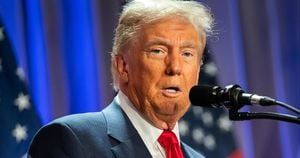International discussions surrounding the Ukraine conflict continue to evolve as recent statements from both political factions and military advisers reflect differing perspectives on how peace might be achieved. According to reports, the Kremlin has highlighted interest from President-elect Donald Trump's circle concerning potential peace negotiations, contrasting sharply with the current U.S. administration's approach, which it claims is focused on militarization rather than dialogue.
Kremlin spokesman Dmitry Peskov, addressing these developments, noted, "Indeed, from the circle of Trump supporters and those who have been nominated for future positions, the word 'peace' or 'peace plan' is being heard. No such words are being heard from the current (Biden) administration as provocations and escalatory actions continue." This statement follows commentary by Mike Waltz, Trump’s selection for national security adviser, who proposed reaffirming discussions to stabilize the region.
Waltz emphasized the urgency of bringing both sides to the negotiating table, mentioning factors like North Korean and Iranian involvement and increased Western military support to Kyiv. He asserted the necessity for discussions concerning the framework of any potential agreement, indicating it should start with what the involved parties can accept.
Conversely, the current Biden administration has faced criticism for its posture toward the conflict. Some Western officials contemplate the possibility of arming Ukraine with nuclear weapons, which the Kremlin has condemned as "absolutely irresponsible." The suggestion emerged following reports such as one from The New York Times, which revealed discussions among unidentified officials proposing to reinstate nuclear arms Ukraine relinquished after the Soviet Union’s dissolution.
Peskov responded by admonishing these discussions as careless and lacking accountability, stating, "These arguments come from individuals with no real grasp of reality." Senior Russian figures have not hesitated to express their positions as well, with Dmitry Medvedev warning such transfers could justify nuclear responses from Russia.
Ukrainian President Volodymyr Zelenskyy has also highlighted the need for western support, emphasizing military aid as pivotal for Ukraine to negotiate from a position of strength. He expressed gratitude to Western leaders like German Chancellor Olaf Scholz, who recently communicated the significance of global unity against Russian aggression. Reuters reported on their conversation, where Zelenskyy thanked Scholz for supporting Ukraine's air defenses, underscoring the importance of collaboration through both arms and diplomacy.
Despite these discussions, Scholz has rejected calls from Ukraine to provide long-range missiles, instead maintaining Germany's commitment to support Ukraine militarily. The backdrop of these high-stakes talks was marked by the increasing tensions on the battlefield, with several recent exchanges of missile fire between Ukraine and Russia indicating heightened hostilities.
The appointments of new advisers by Trump signal his intentions to shift U.S. policy if he becomes president. Lt. Gen. Keith Kellogg, named as Trump's Special Envoy for Ukraine, has suggested the potential for Ukraine's NATO membership being leveraged as part of peace negotiations. His stance reflects Trump's previous claims of being able to resolve the conflict swiftly, indicating negotiations could commence immediately upon his assumption of office.
During his campaign, Trump has maintained this ambitious narrative, asserting, "I will get it settled before I even become president." His focus on negotiations contrasts sharply with Biden's approach, which has involved direct military intervention against Russian actions, advocating for Ukrainian resilience.
The complexity of these dialogues is underscored by the recent calls for troop-level increases and discussions around NATO's approach to Ukraine. Ideas floated by advisers to Trump align with the notion of enhancing Ukraine's defense capabilities alongside initiating discussions with Russia, which could combine diplomatic endeavors with strategic military partnerships.
Meanwhile, Ukraine remains steadfast on its front lines, emphasizing the need for unity among allies. Zelenskyy articulated the belief, "True peace can only be achieved through force," as he rallies support for continued military aid to bolster their defenses against Russian advances.
Overall, the stark contrasts between the Biden administration's current policies and proposed changes under Trump reflect the high stakes involved as nations navigate this intense geopolitical conflict. The initiatives being proposed by Trump's team indicate a possible shift toward direct negotiations combined with military support rather than solely focusing on escalatory measures. Whether this approach will resonate with global partners remains to be seen amid the continuing turmoil on the ground.
With every new announcement, it becomes clearer just how complex and multifaceted the path forward for Ukraine and its allies has become. Observers will be closely monitoring these developments, as clear communication and decisive actions from U.S. leadership will significantly impact the overall outcome of the conflict.



